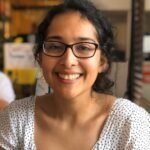Aliah Zewail: Lava Lamp
Aliah is a recipient of the 2019-2020 MALA Scholarship Program, which seeks to assist rising leaders in the pursuit of higher education through the art of storytelling.
As a child, I thought my family was famous. With a confined six-year-old perspective, there was no other explanation as to why strangers would stare. My mom had to have been frequently featured on Forbes 30 under 30 because why else would strangers watch us. However, in time I began to piece it together. It was not admiration that filled their gazes. It was disapproval that influenced their scrutinizing glares. We weren’t famous. We were different.
The insoluble mixtures of my Venezuelan mother raised on Catholic mores and my Egyptian father raised on Islamic values materialized our household to be a cultural lava lamp. Blobs of Latino rhythms and familial greetings contently float in the small-scale Nile that’s dyed with Mediterranean recipes and modesty. However, outside of our burrow, the lava lamp displayed no signs of life as an implicit agreement was made between my family and the community: no outlet in exchange for tolerance. The town claimed it to be imperative to refrain from speaking in our mother tongues if we wished to be granted services. The town asserted that it was of paramount importance not to wear our religious affiliation to be guaranteed safety. Gradually, the multiple dimensions of my identity willingly flattened, easing the ability to re-sculpt my selfhood towards the necessary conformity. However, when my parents began to forsake traditions, when my parents reached to permanently store our lava lamp, I knew it had gone too far. The dissociation we experienced from ourselves was disguised as a false sense of assimilation. The cultural sacrifices we made were not beneficial, but dehumanizing. Despite the side effects of conformity, its practice was inevitably persisted. For as long as we wished for tolerance, they wished for a cold, sunken lava lamp.
Eventually, my family moved and with us, we cautiously carried our lava lamp. Slowly, it was brought back to life and my culturally panoramic mindset served as a prerequisite for the admiring experience I encompassed at my new community and school. The cross-pollination of traditions around me spread because of my school’s diversity. Evidently, the pathways between classes converged into a modern interpretation of the silk road- the routes bred cultural interaction. Across campus, students barter music, foods, and ideas, thus inspiring the fabrication of the school’s own culture. The rhythmic pulses of reggaeton harmoniously fold into the pop-ful melodies of Korean music; Indian spices purposefully snuck their way into the staples of Venezuelan cuisine; Students from both extremes of socioeconomic backgrounds fuse their minds to ameliorate the welfare of the impoverished. Brimming with its students’ experiences, perspectives and backgrounds, the melting pot of my community never ceases to fuel my cultural awakening and development as a person.
My two socially contrasting environments set me at a crossroads: do I survive safely in ignorance and abandon my cultural essence, or do I live expressively in self-fulfillment? Ultimately, my choice of embracing my identity stemmed from my yearning to understand and appreciate my culture as well as the culture of others, of which I was unable to realize until moving. And in doing so, I found my essence; I found my purpose: To unearth the roots of cultural discrimination, to uncover why ignorance is a lifestyle, and to unveil how and why culture inclines the mind towards bigotry. Although I have learned my purpose, my journey towards solidifying my identity will never be complete and that is okay. Because at the end of it all change is the only constant guaranteed in this world, and we as beings need to embrace it internally and together. For to have stagnant aspects of one’s identity is to be plagued with an intolerable mind towards change. Change has fueled my world and continues to craft my identity.


